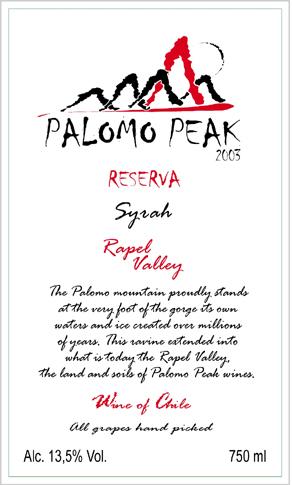2003 Rapel Valley Syrah
Palomo Peak Reserva is a striking red wine that showcases the charismatic qualities of Syrah from the renowned Rapel Valley. With a full-bodied character, this wine exudes richness and depth, making it a delightful choice for those seeking a robust experience. Its acidity is pronounced, providing a lively and vibrant profile that beautifully balances the wine's structure. The fruit intensity is prominent, revealing layers of dark fruit flavors, including luscious blackberries and plums, that are elegantly intertwined with hints of spice and earthy undertones. Tannins are notably firm, adding a sense of sophistication and longevity to this vintage, which has aged gracefully since its production in 2003. With a refined dryness, Palomo Peak Reserva is a remarkable rendition of Syrah that is both powerful and food-friendly, perfect for pairing with hearty dishes or enjoying on its own.
Palomo Peak Reserva is a striking red wine that showcases the charismatic qualities of Syrah from the renowned Rapel Valley. With a full-bodied character, this wine exudes richness and depth, making it a delightful choice for those seeking a robust experience. Its acidity is pronounced, providing a lively and vibrant profile that beautifully balances the wine's structure. The fruit intensity is prominent, revealing layers of dark fruit flavors, including luscious blackberries and plums, that are elegantly intertwined with hints of spice and earthy undertones. Tannins are notably firm, adding a sense of sophistication and longevity to this vintage, which has aged gracefully since its production in 2003. With a refined dryness, Palomo Peak Reserva is a remarkable rendition of Syrah that is both powerful and food-friendly, perfect for pairing with hearty dishes or enjoying on its own.





